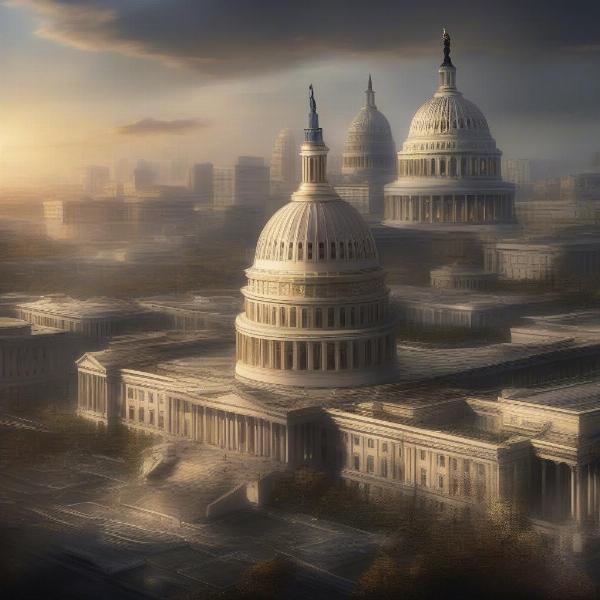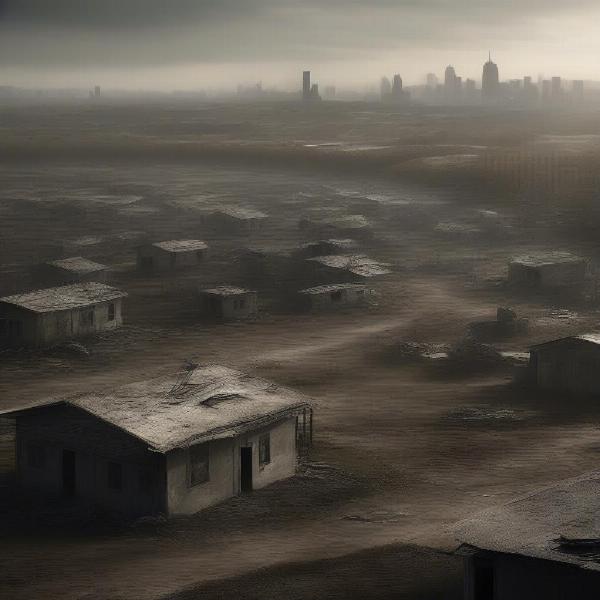The Hunger Games, both the books and the movies, captivated audiences worldwide with their thrilling dystopian narrative. But beyond the action and suspense, What Are The Themes In The Hunger Games that resonate so deeply? This exploration delves into the complex tapestry of ideas woven throughout the series, from the stark realities of oppression and survival to the enduring power of hope and rebellion.
Similar to discussions surrounding the what is the main theme of the hunger games, understanding the multifaceted nature of these themes enriches our appreciation for the story’s depth.
Exploring the Core Themes of The Hunger Games
Several key themes drive the narrative of The Hunger Games. These include the abuse of power, the importance of survival, the consequences of war and conflict, love and sacrifice, and the seeds of rebellion. Each theme intertwines with the others, creating a complex web of social and political commentary.
The Abuse of Power: The Capitol’s Iron Grip
The Hunger Games themselves are a brutal demonstration of the Capitol’s power and control over the districts. The games are not just entertainment; they are a tool of fear and suppression, designed to remind the districts of the consequences of disobedience. The Capitol’s opulent lifestyle, built on the backs of the impoverished districts, further highlights the disparity and injustice that permeates Panem. This theme prompts reflection on real-world power imbalances and the potential for exploitation.
Survival: The Fight for Life
From the moment Katniss volunteers as tribute to protect her sister, survival becomes the driving force of her actions. The arena forces tributes to make difficult choices, often blurring the lines between right and wrong. Even outside the arena, survival is a daily struggle for the people of the districts, who face constant hunger and poverty. This desperate fight for survival resonates with the human instinct to protect oneself and loved ones.
War and Conflict: The Scars of Panem
The Hunger Games are a microcosm of war, with children pitted against each other in a fight to the death. The series also alludes to the past rebellion that led to the creation of Panem, showcasing the devastating consequences of conflict. The physical and emotional scars of war are evident throughout the series, highlighting the lasting impact of violence.
Love and Sacrifice: Katniss’s Driving Force
Katniss’s love for her sister Prim is the catalyst for her journey. Her willingness to sacrifice herself for Prim demonstrates the strength of familial love. The complex relationship between Katniss and Peeta also explores the themes of love, loyalty, and the power of human connection in the face of adversity.
Rebellion: A Spark of Hope
While the Capitol maintains a tight grip on power, the seeds of rebellion are sown throughout the series. Katniss’s defiance in the arena, both intentional and unintentional, inspires hope in the oppressed districts. The Mockingjay symbol becomes a rallying cry for those who seek change, igniting a flame of resistance that threatens to overthrow the established order.
 The Capitol's Oppressive Power in The Hunger Games
The Capitol's Oppressive Power in The Hunger Games
Delving into Secondary Themes: Media Manipulation, Identity, and Morality
Beyond the core themes, The Hunger Games explores several secondary yet significant themes that add depth to the narrative.
The Power of Media and Propaganda
The Games are televised throughout Panem, carefully orchestrated by the Capitol to manipulate public perception and maintain control. This manipulation highlights the power of media and propaganda in shaping public opinion and influencing political agendas. The Capitol controls the narrative, presenting a distorted view of reality to the masses.
The Search for Identity in a Controlled World
Katniss struggles with her identity throughout the series, torn between her desire to survive and her growing awareness of her role as a symbol of rebellion. The pressure of the Games, the media attention, and the expectations placed upon her force her to confront her values and define who she is in a world that seeks to control her.
Moral Ambiguity and Difficult Choices
The Hunger Games presents a world of moral ambiguity, where survival often requires making difficult, sometimes morally questionable choices. The tributes are forced to kill or be killed, and even outside the arena, the characters grapple with ethical dilemmas in their fight against oppression. This theme encourages reflection on the complexities of morality and the challenges of making ethical decisions in extreme circumstances.
 Katniss Everdeen as a Symbol of Rebellion
Katniss Everdeen as a Symbol of Rebellion
The Hunger Games and Real-World Parallels
While fictional, The Hunger Games draws parallels to real-world issues, prompting reflection on contemporary social and political dynamics.
Economic Inequality and Social Injustice
The disparity between the wealthy Capitol and the impoverished districts reflects real-world economic inequalities and social injustices. This theme highlights the consequences of unchecked power and the exploitation of marginalized communities.
The Impact of Reality Television and Entertainment
The televised nature of the Games draws parallels to the pervasive influence of reality television and entertainment in our own society. The series raises questions about the ethics of spectacle and the potential for desensitization to violence. Thinking about the similarities between hunger games and squid game can illuminate how these themes resonate in different narratives. For a closer look at these comparisons, you can read our article, is hunger games like squid game.
Political Oppression and Resistance
The Hunger Games offers a cautionary tale about the dangers of political oppression and the importance of resistance. The series encourages critical thinking about power structures and the need to fight for justice and equality. For those curious about the reading level of the series, you might find our article what is the reading level of hunger games insightful.
 Poverty and Struggle in District 12
Poverty and Struggle in District 12
Conclusion: The Enduring Power of The Hunger Games’ Themes
The Hunger Games presents a powerful exploration of complex themes that resonate with audiences long after the story ends. From the abuse of power to the sparks of rebellion, these themes offer valuable insights into the human condition and the challenges we face in a world marked by inequality and conflict. By exploring these themes, we gain a deeper appreciation for the story’s enduring power and its relevance to our own lives. What theme in The Hunger Games resonated most with you? Share your thoughts in the comments below! You might also be interested in reading more about the specific theme in what is the theme in the hunger games. If you’re curious about the movie’s theatrical run, check out our post on how long is hunger games in theatres.

